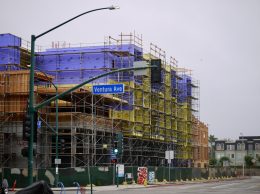Housing should be for residents, not tourists
IN THIS ARTICLE
- Latest news Topic
- Guest commentary Author
By Guest commentary Friday, July 14th, 2017
By Anna Marie Gott
“The use of residential units as short-term vacation rentals and/or only occupied as second homes poses a housing challenge to the city because these uses decrease available long-term housing opportunities for local residents as well as contribute to the increase in housing costs.”
This quote comes directly from the Santa Barbara’s 2015 Housing Element.
On July 18, the City Council will again take up the issue of short-term vacation rentals or STRs. They will need to decide if converting a residential home into permanent commercial use as a hotel/STR is, or is not, “consistent with the principles of sound community planning.” This is perhaps the only requirement standing in the way of this and 31 other residential units over 1,000 square feet that are currently in the pipeline to be permanently converted into hotels/STRs. There are a total of 45 residential conversions in the pipeline and more on the way.
The Condo and Hotel Conversion Ordinance, as it is written, allows for an unlimited number of residential housing units to be permanently converted to use as hotels/STRs annually in the zones were STRs are allowed, which includes R-4 and most commercial zones. This ordinance does not apply to single-family homes or single units that apply for permitting and there is no stated limit for hotel/STR conversions. In my opinion, the ordinance cannot be considered “consistent with the principles of sound community planning” when we have a well-documented housing crisis and the concessions to produce a single unit of housing are so great. But city staff would have you believe that it is in every case.
Given the city’s historically low residential vacancy rate of less than 1 percent, the average vacancy rate of hotels of 24.38 percent, spiraling housing costs, the loss of neighborhood cohesion, and finally the estimated loss of 800 units that are currently being illegally operated as STRs (i.e., as overnight accommodations), I don’t see how the City Council or staff can justify the conversion of a single unit at this time. But they will try to do so.
City staff will argue that the loss of a single residential unit is accounted for in our 2011 General Plan and that the city is on target to produce new housing units. However, staff fails to acknowledge or account for the reported 800 residential units that were removed from the housing stock as illegal STRs, which dwarfs the proposed but mostly unbuilt and radically expensive AUD units. And it fails to acknowledge that our 2015 Housing Element is meant to preserve and create housing, not to permanently remove units from the housing supply. Staff also fails to address the weak and ineffective STR enforcement policies and procedures that fail to permanently remove illegal STRs.
The City Council’s finding, as it relates to “sound community planning” and the conversion of residential housing units to permanent use as hotels/STRs, will decide the fate of up to 8,900 residential units and the future of the city. I think our City Council should be more concerned about putting the needs of our local residents, who make Santa Barbara their home and who are in desperate need of housing, above the wants of STR operators who seek to provide public accommodations to tourists, when the city has plenty of available hotel rooms.
If our city leaders choose to shift our limited housing resources toward tourists and away from residents, we will know where their priorities lie.
If you are interested in the fate of our residential housing in Santa Barbara, I urge you to attend the City Council meeting on July 18 or send the City Council a letter.
To find out more information, contact [email protected].
• Anna Marie Gott is a longtime resident of Santa Barbara County.










